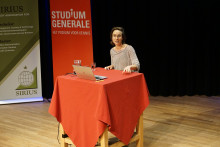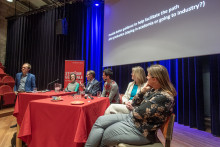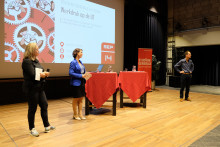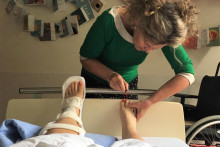'As a journalist, I want to create a broad political image. I want to tell the story of people behind the ballot', the America expert said during her lecture. What are their reasons for voting and what drives them to vote for their favorite candidate?
Frank herself lives in the Netherlands for part of the year, but also spends part of her time in the United States. In the state of Pennsylvania to be specific. 'Pennsylvania, where I live, is an unpredictable state when it comes to election results. The fanatical Democrats and Republicans are not going to make a difference during the election. The people we don't hear or see are the deciding factor on November 5th. For that reason, it is a state in which an awful lot of campaign money is pumped. We receive leaflets and flyers through the letterbox every day and see everything about the elections in the media continuously. People are very encouraged to vote.'
'Digging in residential areas'
The journalist scours neighbourhoods and districts in search of stories behind the casting of the vote. The America expert has her own podcast: 'Welkom in Washington'. In this series, she discusses everything about the American elections. The 'common man' is also given a stage. During her lecture, this becomes clearer and she gives examples of six neighbours she interviewed. Frank mainly encounters people with dilemmas who struggle in making their choice. 'I talk to people who voted for Joe Biden in the last election. What I see is that they weren't necessarily for Biden, but they voted for a Democrat to prevent Trump from getting into the White House. So they didn't stand behind the person they were voting for. That's why people are now asking: am I voting again for a party that disappoints me and doesn't give me confidence? This is a major dilemma in society', Frank observes. 'Until the last day, people don't know who to vote for.'
Voting system
The fact that voting between two sides is difficult is partly due to the electoral system. In addition to Frank's personal stories, she also briefly discusses the workings of the American electoral system. For example, it discusses how a vote counts, which state is seen as a 'swing state' and which states will make a difference in the future. One of the visitors has a question about the electoral system. The American expert clearly has an opinion about the system. 'I think the current electoral system with Democrats and Republicans needs to change, but that takes an awful lot of time to get that done.'
Trump in Harris
At the end of the lecture, which Studium Generale organised together with Sirius, the fire of questions erupted. What are the positives and negatives of both candidates? 'That's a very good question. Trump is a real campaigner. He's been a salesman all his life. He does that well. In addition, he shakes everything up, so that more people are politically active. Something is happening, and it's positive for America. The fact that he is unpredictable makes him negative. After all, what will he do with difficult issues that arise? Like the NATO issue and the situation in Ukraine,' Frank wondered.
'Harris is more into long sentences and concepts. That doesn't really make her a campaigner. People quickly drop out and don't keep their attention. The political style and power of the democrats is not always positive either. They see her as a capable president, but she is still underestimated. Finally, she can become the first female president and stand up for people of color,' says Frank. After she has answered all the questions in detail, Peter Timmerman of Studium Generale indicates that the time is almost up. 'Frank really has to move on to the next lecture.'






